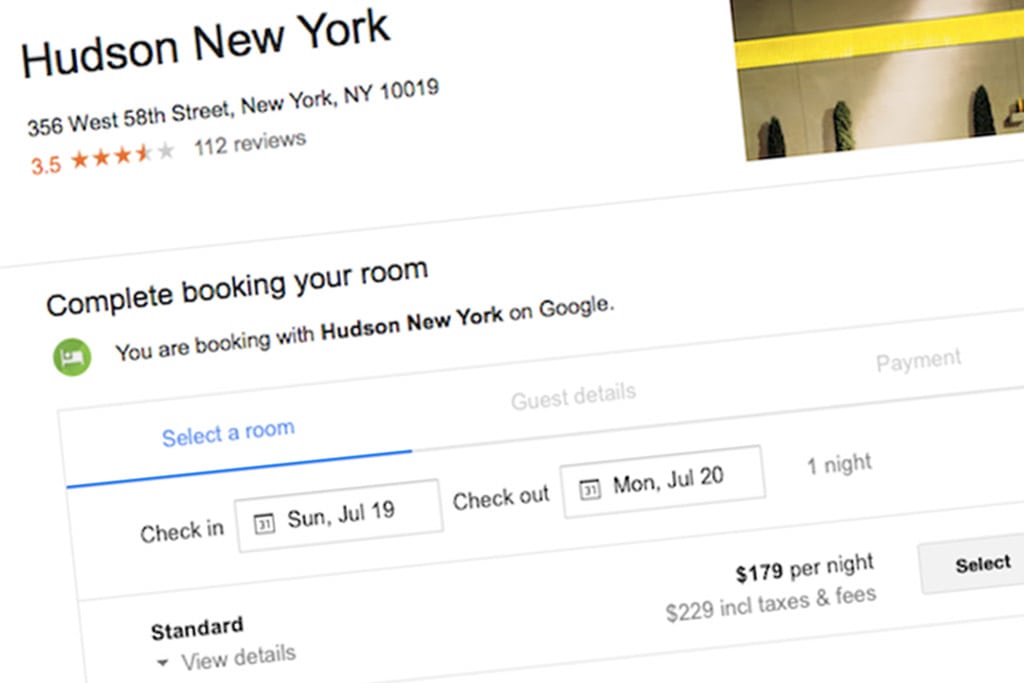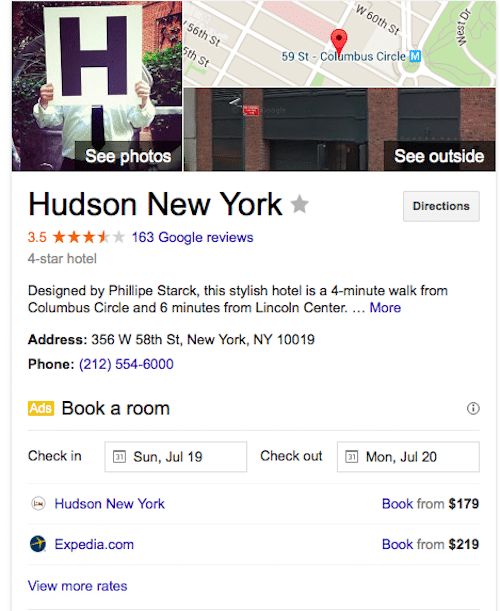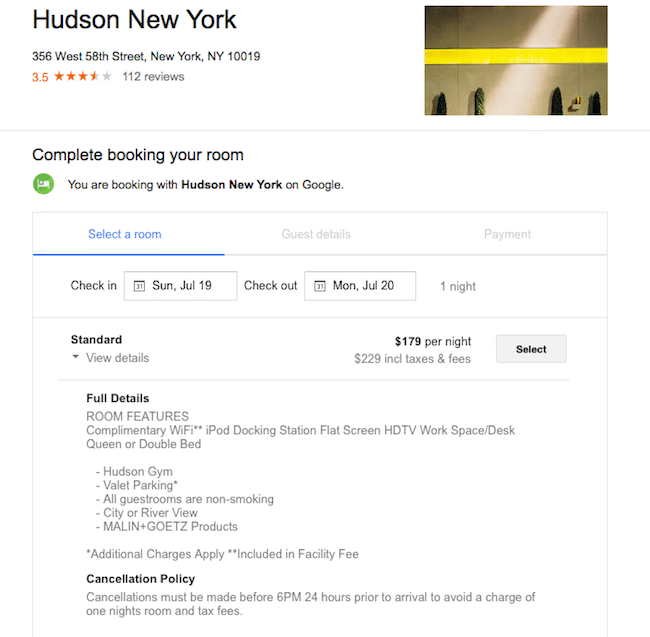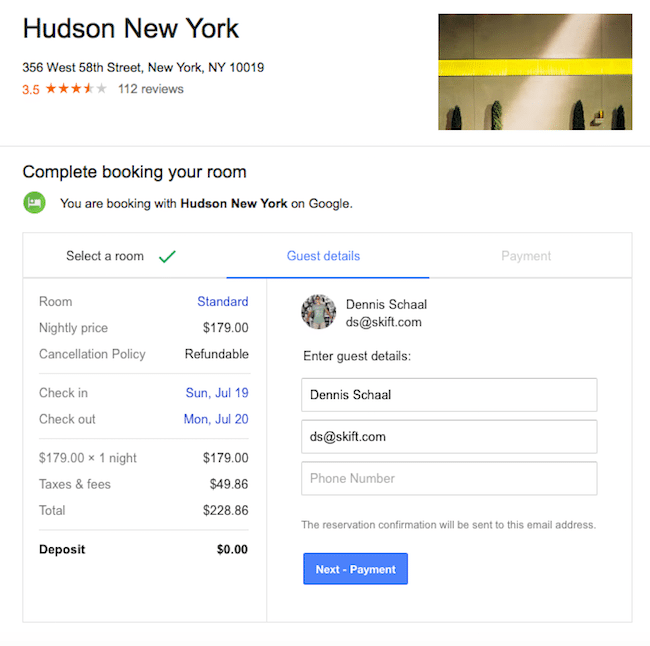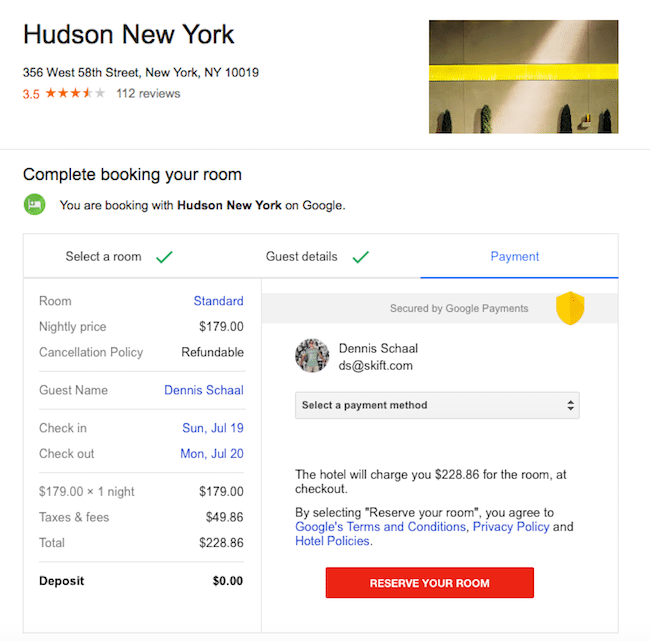Skift Take
For Google, the new program means it has the potential to become even more of a central hub for the travel industry as it can offer hotel-booking functionality to its massive base of users on desktop and mobile, in search and maps. Just wait until Google integrates flights and hotels. That's coming too.
And so it begins as travelers can now book some hotels right on Google Search, Google Maps and Google+.
The “Book on Google” initiative initially comes through a partnership with Sabre, which is running a beta in North America, allowing its hotel partners to choose to pay commissions to Google and Sabre for credit card transactions that Google handles right on Google platforms.
Alternately, hotels can continue to pay for clicks instead of paying commissions to Google through Google Hotel Ads. The latter program now offers both commission and cost-per click payment programs.
You can expect other hotel central reservations systems to sign up for the Google program, meaning Google can ramp up Book on Google, formerly called Google Wallet, at scale when it chooses to do so. Sabre, for example, has 20,000 hotels hooked up to its system, although it will be up to the hotels whether they want to participate in the Google Hotel Ads commission program.
For hotels, the commission program means they are likely to get more conversions from Google when travelers book directly in Google Search, Google+ or Google Maps because consumers aren’t getting lost in the handoff from Google to the hotel website. On the other hand, hotels in this scenario must share revenue with Google and Sabre, and may choose instead to focus on attracting direct bookings of their own instead of going the revenue-share route.
For Google, the new program means it has the potential to become even more of a central hub for the travel industry as it can offer booking functionality to its massive base of users on desktop and mobile.
When travelers book a hotel directly on Google Search, Google Maps and Google+, Google handles the credit card transactions, and the hotels handle everything after that, including customer service.
When searching Google for the Hudson New York hotel, the user gets booking options from the hotel and Expedia in initial Google search results.
If the user selects the Hudson New York booking option, the user navigates as part of the checkout process to a Google Travel page (travel.google.com), where guests can change dates, view amenities and see the message: “Complete booking your room. You are booking with Hudson New York on Google.”
Once users select a room, they navigate to a page to enter an email address and phone number. In the instance below, it shows the base rate, taxes and fees, total rate, and the fact that this is a refundable/pay at the hotel reservation. The user is again reminded: “You are booking with Hudson New York on Google.”
After selecting “Next – Payment,” users navigate to a reservations page and see that in this case their credit card will only be charged at checkout. If users have already input their credit card into Google Wallet they can select it to reserve their room or they can enter a new card. The advantage is they don’t need to keep entering their credit card details each time they use Google to book or reserve a room. They can also read the hotel’s cancellation policy by clicking on a link before reserving the room.
Upon reserving the room, the user gets a confirmation email from the hotel.
Google initially entered the travel industry as a powerful advertising platform and supplemented that business by acquiring ITA Software, and turning it into Google Flights, and then building Google Hotel Ads, a metasearch platform.
Now with Sabre’s North America beta launch of hotel bookings right in Google Search, Google Maps and Google+, Google is taking a more central role as a travel booking site.
You can expect a protracted period where Google will experiment with the hotel booking product so the way it looks today may not resemble the end product a few years from now.
As a result, hotels could become even more reliant on Google and some online travel agencies may choose to jump on board, as well.
TripAdvisor has its own competing product in Instant Booking and is much further along than Google is at this juncture. In one point of difference, Google is processing the credit card transactions in its direct booking product while TripAdvisor takes bookings on TripAdvisor sites and on mobile but leaves the credit-card processing up to the hotels.
Neither Google nor TripAdvisor is heading toward becoming an online travel agency with their own customer service staffs but never say never.
In the interim, Google Travel is starting to take shape.
The next step would be to integrate Google flights and hotels. Travel.google.com anyone?
The Daily Newsletter
Our daily coverage of the global travel industry. Written by editors and analysts from across Skift’s brands.
Have a confidential tip for Skift? Get in touch
Tags: google, hotels, tripadvisor
